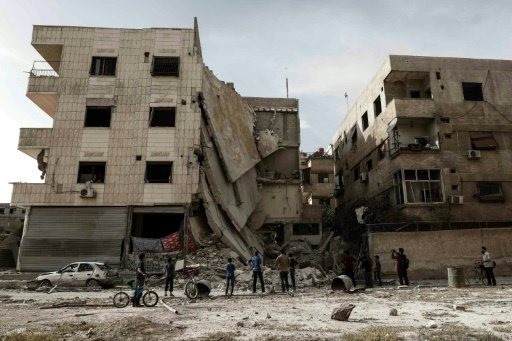 World
World

Health care workers, clinics and hospitals were attacked more than 400 times last year in Syria’s civil war, according to data gathered with the mobile phone application WhatsApp, a medical journal reported on Friday.
 |
| People inspect a hospital, damaged following an air strike a rebel-controlled town in the eastern Ghouta region on the outskirts of the capital Damascus on May 1, 2017. – AFP/VNA Photo |
PARIS – Health care workers, clinics and hospitals were attacked more than 400 times last year in Syria’s civil war, according to data gathered with the mobile phone application WhatsApp, a medical journal reported on Friday.
A total of 402 such attacks – many of them fatal – were registered between November 2015 and December 2016, researchers reported in The Lancet.
Nearly half of hospitals in non-government controlled areas were hit, a third of them more than once, during that period.
"The so-called weaponisation of health care – the purposeful use of violence to restrict or deny access to health care as a strategy of war – has reached unprecedented levels in Syria," the authors said.
The country’s civil war, now in its seventh year, has claimed more than 320,000 lives. More than 800 of those killed since early 2011 were health care workers, The Lancet reported in March.
In the period covered by the new study, nearly 700 people were injured in attacks on health care-related targets, and 261 were killed.
The data was collected using a WhatsApp group with 293 members spread across some 350 health care facilities in Syria, supported by a World Health Organisation (WHO) team based in Turkey, which coordinates humanitarian work done by the United Nations and dozens of NGOs.
When incidents occur, members post short messages in real time, and later fill out anonymous and confidential forms providing details such as location, type of attack, and the number of injuries and deaths.
Every month, data is verified by checking the WhatsApp alerts against other reports.
"Until now, there has been no standardised method of collecting robust data," the study’s authors said in a statement.
With more health care facilities targeted, nurses and doctors on site have had to become resourceful in trying to keep patients out of harms way, said Alaa Abou Zeid, emergency coordinator for the WHO team.
Measures taken include "dividing facilities – such as operating theatres and post-operative care – among locations to reduce the risk that all services are affected" in case of an attack.
Another was to move "entire services underground," he said. "Our challenge now is to convince our colleagues on the ground to continue collecting and verifying data."
The study is part of a larger evaluation of how health care data is gathered during humanitarian crises such as those in Afghanistan, the Central African Republic, Iraq, Libya, Somalia, South Sudan and Yemen.
Worldwide, an estimated 172 million people are affected by armed conflict, including 59 million people displaced -- the highest number since World War II. – AFP




